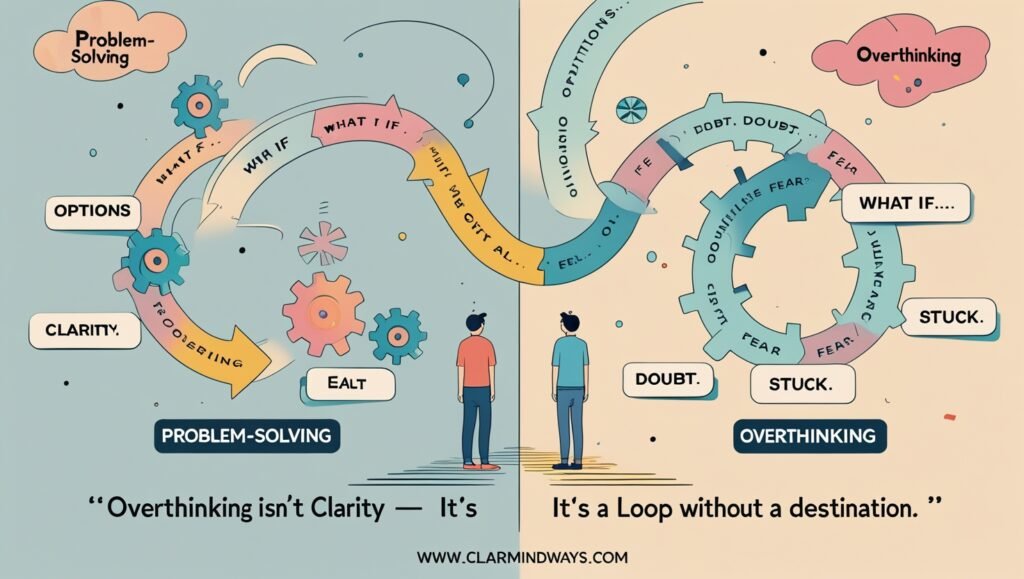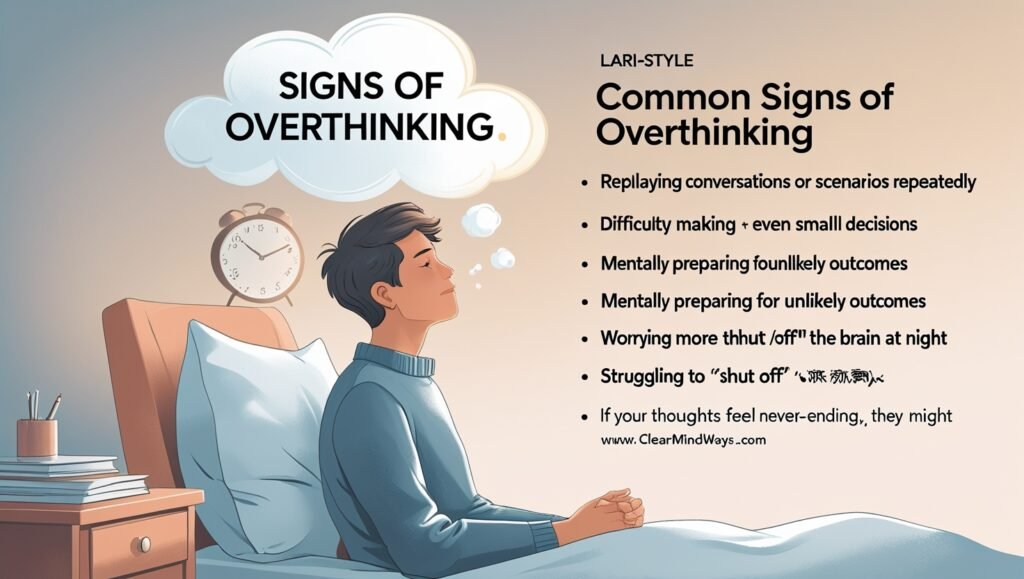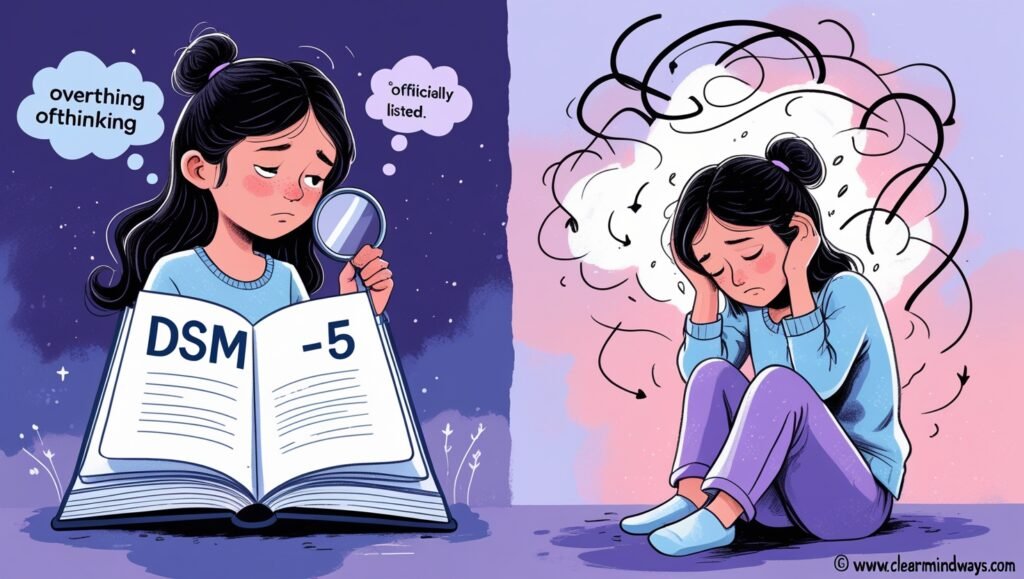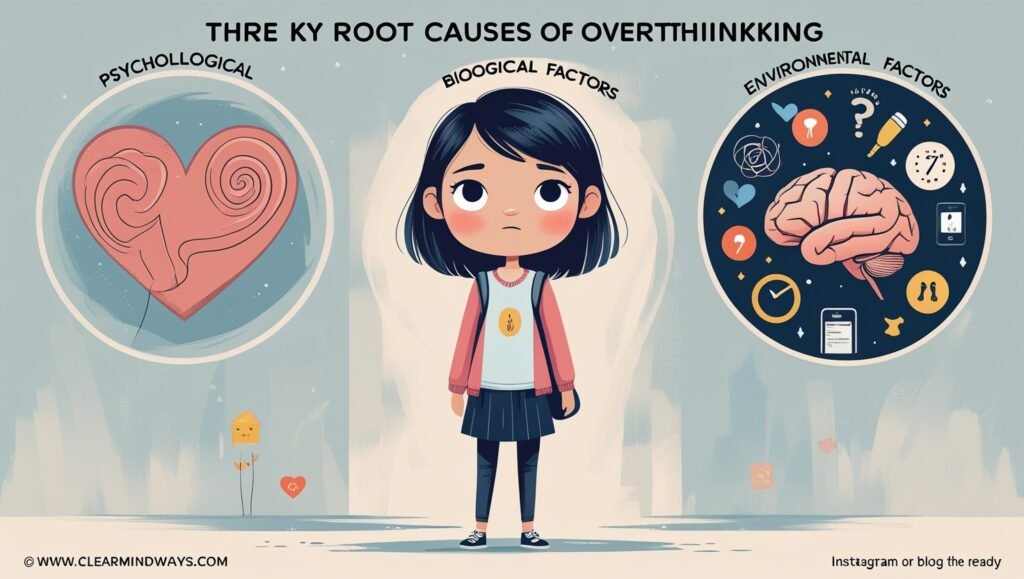Why Do I Overthink Everything? Psychology Behind It
Do you get caught in “what if” loops of thought? Do you spend hours thinking about all the possible outcomes of a decision until you’re paralyzed or exhausted? You’re not alone. Overthinking impacts millions of lives globally, resulting in a mental prison that can be nearly impossible to break free from.
Overthinking is not simply constructing a plan or considering the options. It’s called a cycle of rumination because it is: a cycle of repetitive, often negative thoughts about yourself, your situation, or your future. Overthinking has a hijacking effect on decision-making, problem-solving, interpersonal relationships, and how we show up for life.
The first step to breaking out of them is to understand why they hold you captive. This ultimate guide is going to unlock the cause of overthinking, the mechanism of overthinking, and more importantly, how to stop overthinking by using some science-based strategies to regain control over your mind and get a peace of mind.
Key takeaways
- Overthinking is a cycle of negative thought that can be detrimental to mental health and life quality.
- ” Overthinking is most often two types of thinking: rumination (dwelling on things that happened in the past) and worry (fretting over what’s coming in the future).
- Insecurity: If you’re insecure, it’s quite likely to drive you to think and overthink everything to save yourself from embarrassment.
- Useful strategies such as wellness, reframing, and a care routine may help to break the overthinking patterns.
- If such overthinking badly affects one’s life, then professional help through therapy or even psychiatric care may be needed.
- Overcoming overthinking is a process – it won’t happen overnight – but healing is achievable, and living a life of greater ease and well-being is 100% possible with the right tools and support.
What exactly is overthinking?
Overthinking (also known as rumination or excessive worry) is a chain of thoughts that are repeated and distort rational decision-making, leading to cost or paralysis. Unlike useful problem-solving, overthinking seems not to get anywhere clinically, but can lead to never-ending cycles of repetitive ruminations (1).
When you overthink, recrimination takes root – you become stuck in a mental loop of lost details and things done wrong, and what is happening, and it’s not going to work out, it can’t work out, and here’s why it won’t, in a loop. This habit of mind can run rings around you for hours, draining your emotional energy and leaving you feeling anxious, frustrated, and mentally weary.

Overthinking can manifest differently for different people. Some people may ruminate over what was said and done in an exchange, reading into every word and gesture for their hidden meaning. At the other extreme, others might ruminate for hours over all the potential ways a future event could unfold, and be paralyzed by the many lenses through which they could view a situation. Others may become mired in cycles of self-criticism, revisiting and reliving past mistakes and failures.
The difference between regular thinking and overthinking is productivity and resolution. If all thinking processes are in good order, then an insight or non-resistance to a situation will occur. But overthinking leads to a mental hamster wheel in which thoughts cycle infinitely without going anywhere.
Signs of Overthinking

Although overthinking is often difficult to identify in oneself, since it can seem so justified in the moment. However, there are clear indicators that show when thinking has veered into the overthinking zone.
Mental Log: Recurring thoughts that we can never resolve, obsessing over conversations that compel us to analysis, future tripping and imagining the worst possible outcome of future events, questioning decisions for days, even years, after we made them, and also making it nearly impossible to focus on the moment in front of us or finish tasks because our thoughts are racing.
Overthinking is often accompanied by some debilitating physical symptoms. These could involve tension headaches, tight muscles, especially in the neck and shoulders, difficulty falling asleep or staying asleep, fatigue even though we are getting enough rest, stomach problems or changes in appetite, and feeling restless or an inability to sit still.
Behavioral signs: An overthinker might put off decision-making, ask for too much reassurance, avoid situations that trigger overthinking, check and recheck their messages or work, or withdraw from social activities to prevent potential triggers.
Emotional indicators include being paralyzed by small decisions, worrying about future activities, regretting past actions, snapping when interrupted during mental processing, and feeling mentally spent but without much to show for the work.
Is overthinking a mental illness?
Overthinking is not identified as a mental health problem in diagnostic manuals such as the DSM-5. However, it is also a common symptom or feature of many mental health problems, and chronic rumination can certainly take its toll on your mental well-being and overall quality of life.

Overthinking is a fundamental part of several medical diagnoses for mental health. Generalized Anxiety Disorder reflects the propensity to worry about a wide range of life domains, and Social Anxiety Disorder frequently engages in repetitive thinking about social interactions and consequences. Depression is commonly associated with ruminations about prior failures, defeats, or perceived negative attributes. Obsessive-Compulsive Disorder is characterized by intrusive, repetitive thoughts, and Post-Traumatic Stress Disorder can be associated with recurring thoughts about traumatic experiences.
When overthinking is separate from these disorders, it can lead to considerable distress and dysfunction. Chronic overthinking can also result in analysis paralysis, which can cause relationships to crumble and work to come crashing down.
The relevant factor is that overthinking is a spectrum. We will all go through times when worrying thoughts or rumination is worse, particularly when we are experiencing stress. But when the overthinking is chronic, uncontrolled, and really interferes with your life, it might be time to seek professional help and treatment.
What causes overthinking?
Knowing the underlying cause of overthinking can help you figure out how to counter it most effectively. Overthinking is seldom an isolated issue - it results from a mix of psychological, biological, and environmental factors.
One of the most prevalent causes of overthinking is created when we are looking to be perfect. I personally don’t think it is always the case that there’s a “right” way to do things, and I always took the attitude, “you’re doing it, so just do it,” which is why my concerns are not just pressure, but always struggling with perfectionism. Perfectionists often think that there’s one “right” way to manage every situation and they wrestle with their decisions indefinitely to make sure that they always make the correct choice. This can lead to analysis paralysis, when a fear of the wrong decision takes over and no decision is made at all.

Old experiences, especially those that were traumatic or very stressful, can set the brain for scanning and tracking for potential dangerous or problematic events. If you have been betrayed or lost or failed before, your mind may overanalyze your current situation to avoid a repeat of those unsavory circumstances.
Anxiety-related conditions tend to make people overthink their lives. This is what happens when your brain’s alarm system is too sensitive, when it overheats for no reason and tells you that some neutral event may portend doom — leading to excessive analysis and worry over potential negative outcomes.
The overthinking behavior can be fed by low self-image and insecurity. If you have a lack of self-confidence and don’t believe you have what it takes to make your own decisions, you could be overanalyzing decisions, asking for too much input from others, and questioning again and again the choices you’re making.
So do learned behaviors. You may have developed the skill of approaching situations with high levels of caution or exaggeration of threat through a role model of catastrophic thinking by your parents or caregivers, if you grew up in an environment where catastrophic thinking was modelled.
Genetic and brain chemistry issues may play a role in developing an overthinking habit. Some people are naturally more sensitive to stress or have brain patterns that make repetitive thinking more likely.
Types of overthinking
Here’s a powerful breakdown of the most common cognitive distortions that power overthinking:
Overthinking can come in many forms and lead to cognitive distortions — warped ways of seeing reality that don’t necessarily align with the truth. Here are several of the most common patterns that ensnare people in looping thoughts.
- The all-or-nothing mindset is when you see things as black or white but not grey. Everything is perfect or totally fucked up, brilliant or dumb, right or wrong. For instance, when you flub something during a presentation, your thought is “I’m terrible at public speaking” instead of realizing you made one tiny gaffe in what was otherwise a great presentation. This misperception creates no room for nuance, and prevents you from seeing the entire range of outcomes, leaving you sitting there analyzing why things weren’t “perfect.”
- Catastrophizing occurs when your mind jumps to the worst possible conclusion while treating the outcome as a foregone conclusion. You could get a text from your romantic partner saying “we need to talk” and automatically assume that it is a breakup — even though they may just want to talk about plans for the weekend. This is a pattern that causes a lot of undue stress and hours of prepping for disasters that never come.
- Mind reading is where you act as though you can read other people’s minds, and you believe they are thinking negatively about you. If someone doesn’t reply to your text right away, you might tell yourself that he or she’s mad at you or doesn’t want to talk to you, when in fact the person is simply busy. As a result, there is much analyzing of other’s actions and thoughts with no real evidence at all.
- All or Nothing; Overgeneralization Mislabeling You take one thing that is bad and make it apply to each situation. If you’ve ever had a weird encounter at a professional social event, you might think “I suck at networking” and decide that you should steer clear of mingling with colleagues in the future. This self-fulfilling cycle of belief does not allow for learning and growth as it takes individual incidents and treats them as fixed character traits.
How do I stop overthinking?
Escaping overthinking cycles demands an approach as layered as the condition itself, touching both immediate symptoms and root causes. The following approaches have been well researched and demonstrated useful in clinical practice.
Break your routines
Step Out Of Your Pattern Switch up your daily pattern to get out of your head. Go by different roads or methodically rearrange your space or try new activities. Physical activity such as walking or stretching is an automatic switch that profoundly shifts your brain’s focus off of internal thoughts onto external sensations.
Experiment with reframing
Try Reframing: Challenge your automatic thinking by wondering: “Is this helpful?” “What is the evidence for that?” “What would I tell a friend?” Calm down by replacing catastrophic ideas with balanced ones. Try instead of “This is going to be a disaster,” “I’m ready, whatever happens, I can handle it.”
Practice mindfulness
Do Mindfulness Activities: Mindfulness techniques are all about staying in the moment and include breathing exercises, body scans, or the 5-4-3-2-1 (notice 5 things you see, 4 you hear, 3 you touch, 2 you smell, 1 thing you taste). Over time, you can lower the amount of overthinking, wind back the clock a little on negative thoughts that persist, and have access to more of your logical mind. (Even 10-15 minutes of meditation a day has been shown to achieve this.)
Start therapy
Professional guidance provides tailored tactics. Cognitive Behavioral Therapy (CBT): A useful practice in which one can recognize and realign negative thought patterns. Acceptance and Commitment Therapy (ACT) is about accepting thoughts that are difficult to think, and not fighting with them.

Online psychiatrists offer easily accessible treatment for anxiety and overthinking, and it is often covered by insurance. Appointment stress is removed by virtual care, which can be scheduled at a time convenient for the patient.
Try Acceptance-Based Approaches: Instead of attempting to battle overthinking, try accepting it: “Right now I’m having overthinking thoughts.” Employ the “leaves on a stream” visualization — see thoughts float by without getting involved. Schedule daily “worry time” so you can keep anxious thoughts confined to certain times of the day.
Overthinking too much? When to get help
Let’s break down the basics – if you’ve been asking yourself if it’s time to seek professional help, these warning signs indicate that you should consider seeing a psychiatrist:
- You are overanalyzing, which is making you put off or, worse yet, neglect taking care of your duties or chores.
- You’ve stopped going to parties, work events, or going out with your friends over worrying.
- Your mind seems to be on autopilot, and no matter what you do, the mental storm won’t subside.
- You’re having physical issues, such as headaches, trouble sleeping, or stomach pain, that are caused by stress.
- You constantly need to have others reassure you about your choices or thoughts.
- Your relationships are crumbling because you’re withdrawn, snappish, or needy.
Through the support of a licensed therapist or counselor, you can learn more about the origins of your overthinking and how to find healthy ways to cope. They can also assess if your symptoms are a sign of an underlying problem, such as generalized anxiety disorder, depression, or ADHD, and develop a tailored treatment plan.
We are experts in treating anxiety-based disorders, mood disorders, ADHD, and other problems using scientific psychotherapy and, when necessary, medication. We offer entirely virtual psychiatric care, so care is never far away.
Ready to take the first step? Take our short screening test to be connected with a verified psychiatrist who will be able to help you control your head and give you back your life.
FAQs about overthinking
What is overthinking a symptom of?
Ruminative thinking can also act as a symptom of other issues, such as anxiety disorders (for example, generalized anxiety or social anxiety), for whom rumination is an overwhelming, all-encompassing experience. It’s common in depression, too, often in the form of rumination on past failures or negative thoughts. Anxiety or OCD can create intrusive, recursive thoughts, and perfectionism or low self-esteem can drive an advanced analysis to avoid making mistakes and being judged. Excessive thinking can be exacerbated by chronic stress, trauma, or neurodivergent conditions such as ADHD, as a result of cognitive and emotional dysregulation. It can also be provoked by situational factors, such as significant life changes.
What does it mean if you overthink everything?
Overthinking everything is when your mind gets stuck in a cycle of endlessly worrying, carefully weighing all the decisions you’ve made, replaying conversations in your head, or trying to predict worst-case scenarios. This fear is generally based on a fear of failure, a fear of rejection, or a fear of uncertainty, which ends up with decision paralysis, mental fatigue, and increased levels of stress. This behavior is disruptive to attention, sleep, and other relationships, and may indicate an inability to release unproductive thoughts.
What causes overthinking?
The causes can range from psychological factors (fear, perfectionism, and low confidence) to biological factors (overactive brain regions responsible for fear and anxiety) to social factors (stress, trauma, and information overload). Cognitive distortions, such as catastrophizing and unresolved situations, also contribute.
How do I stop overthinking as much?
To stop thinking, be as present as you possibly can be (i.e., take 5-minute breathing sessions). Rise up against negative thoughts by questioning their evidential basis. Decide with time pressure, so you don’t get paralyzed. Do some sort of activity to take your mind off things (e.g., exercise, hobbies). Keep a journal to externalize thoughts, practice self-compassion, and limit social media to minimize triggers. When overthinking becomes chronic: For those for whom overthinking and negative thoughts are a way of being, there is Cognitive Behavioral Therapy (CBT) or professional assistance available. One-minute fixes include a 5-4-3-2-1 grounding technique, scheduling “worry time.” Seek a therapist if it’s all too much.






